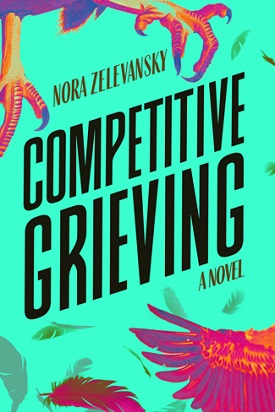 Synopsis:
Synopsis:
Wren’s closest friend, her anchor since childhood, is dead.
Stewart Beasley. Gone.
She can’t believe it. And she definitely can’t bring herself to google what causes an aneurysm.
Instead of weeping or facing reality, Wren dreams up the perfect funeral plans, memorial buffets, and processional songs for everyone she encounters . . . from the corner bodega owner to her parents. Thankfully, none of whom show any signs of imminent demise.
Stewart was a TV star who had already won an Emmy and People’s Choice award. But for reasons Wren struggles to understand, he often surrounded himself with sycophants that Wren found amusing while he was alive, but, now that’s he’s dead, are utterly intolerable. His icy mother reveals that Stewart left a will in which he assigned Wren the task of sorting and distributing his possessions alongside George, Stewart’s maddening, but oddly charming lawyer. Wren didn’t realize that Stewart had another friend who was a lawyer, much less that he had prepared a will.
Wren soon finds herself at the epicenter of drama she wants no part of: Stewart’s friends competing to own a piece of Stewart’s memory (sometimes literally).
Remembering the boy Stewart was and investigating the man he became, Wren finds herself questioning if she ever really knew the person she considered an extension of herself. Whether it is possible to ever fully know someone. And how well she knows herself.
Review:

Zelevansky says her novels are “delayed coming-of-age stories, inspired by the universal struggle to let go of the past and reimagine oneself again and again, . . .[and] follow characters who resist change as they navigate periods of grudging transition: college graduation, the approach to 30, grief and acceptance.” She aptly describes Competitive Grieving as funny, sad, hopeful, true, and universal. The story was inspired by the deaths in 2017 of her uncle and one of her oldest friends shortly after his fortieth birthday. She relates that she was “pregnant and struggling; the world felt like it was in turmoil.” And losing her friend “rocked my world on every level, but, also, I witnessed — and experienced — grieving in a different way than I had ever expected.” She also observed erratic and disturbing behavior by people who, it seemed to her, seemed to need confirmation of their relationship with the decedent.
It’s not the crying or the sadness or the organizing of funerals and tributes or the stuff you keep; it’s the time in between when you miss the person and wish you could have them back. it’s the absence of someone you love — the times you wish you could give them a call and then realize . . . you can’t. I think we’re all just trying to feel close to him in the best way we know how. ~~ Wren
In Competitive Grieving, Wren is dumbstruck when her friend Gretchen arrives at her apartment — just as she is about to get comfortable and watch the finale of The Bachelor — to inform her that Stewart, her long-time friend and confidante, has suddenly died from a brain aneurysm. It explains why he failed to respond to her text messages, and inspires guilt — their last conversation was another argument about Stewart’s belief that she didn’t dream big enough, and was squandering her life and potential, settling for less than she was capable of and deserved. She and Stewart had an agreement. They would be each other’s “last resort” and, if neither found a partner by the time they were 40, would get married. Wren is strangely unable to cry, just as when her grandfather died. Or fathom that Stewart is gone forever, and she will never have the chance to see him again, no matter how many times she repeats to herself, “Stewart. Gone. Forever. . . . I don’t remember life before we met. I can’t believe it’s true. Just something bursts in his brain, something maybe waiting there since he was born, and that’s it? His life is just over” Irreparably? It doesn’t make sense.”
Stewart’s unexpected death sets off an obsession not just with how Stewart died, but death itself. Suddenly, Wren fantasizes about the cause of death and subsequent funeral of every person she encounters, her vivid imagination conjuring up what she deems appropriate manners of death for each person, as well as menus for the funeral luncheons. Her first-person narrative is often both darkly hilarious and heartbreaking. Zelevanky says that when her friend died, she missed him and “wanted to talk to him about what was happening — but he was gone.” So too Wren has an ongoing internal dialogue with Stewart, telling him what is happening and how she feels about it all. “I’ve been playing this involuntary game in my head since you’ve been gone. . . . This make-believe event planning has become constant. . . . I plan touching but funny eulogies for everyone from Gretchen to my dad to our old history teacher, Mr. Harvey. . . . I plan how I’d find out that each person died too. . . . I plan my reactions. My shock. My dismay. My aftermath. I plan. I plan. I plan for things one cannot plan. Like losing you.”
Wren also becomes fixated on understanding exactly what was happening in Stewart’s life in the days leading up to his death. She is forced to acknowledge that she and Stewart had not been as close as they once were. She had let him slip further away, into his life in Hollywood that did not include her. She is shocked to learn that not only did he prepare a will, but that it was drafted by George, an attorney and friend that Stewart never mentioned. She is even more surprised to learn from Stewart’s grieving, but stalwart mother, Helen, that she and George are to sort through his apartment and decide what should be donated, discarded, or passed on to family members and friends. It is a daunting task, but Wren agrees.
Stewart’s friends are notified that they should come to his apartment to peruse his belongings and note any items they would like to keep in order to remember him. It is there that Wren is exposed to a group she refers to as “the vultures,” as she watches them callously riffle through Stewart’s belongings and claim everything from his clothing to the artwork he collected, his scripts and awards, and the ring given him by his grandfather that Stewart always wore. They include Blair, his overbearing publicist; a would-be fellow actor, Keith; Mallory and Brian, a couple who seem particularly anxious to hoard whatever items they can get their hands on; and Stewart’s former girlfriend, Willow (“Bohemian Barbie,” according to Wren), who decrees that she wants them all to participate in a ritual designed to help Stewart because she is concerned about his “crossing into the next realm. . . . My intuitive says that he’s confused and stuck. He doesn’t know how to transcend.” Listening to and watching their increasingly appalling behavior, Wren wonders why Stewart surrounded himself with people he didn’t respect and curses him for leaving her to deal with them.
Zelevansky compellingly takes readers along with Wren on her journey through the stages of grief, as she follows through on her commitment to Helen, discovers things about Stewart that she never knew, and realizes that she made numerous assumptions about him, his life, and his relationships with his other friends. Her initially fractious encounters with George evolve, as she finds herself increasingly attracted to him, but their tenuous relationship is threatened when she refuses to accept that, as an attorney, his ethical obligations to his client do not neatly square with her goals.
Throughout the book, Zelevansky deftly and bravely explores how Wren’s profound grief impacts her life. She is in terrible emotional pain, punctuated by regret, and growing confusion and consternation as she learns more details that cause her to question whether she ever really knew Stewart. She is believably repulsed and offended by Stewart’s other friends, perceiving their actions as a competition to prove that Stewart was closest to and loved them best. She ponders why it bothers her so much that the man they describe sounds so different from the Stewart she knew and loved. “Was their Stewart real or was mine?” And as she recalls her friendship with Stewart through the years, the truth she discovers is not always palatable or easy to accept. Zelevansky believes that when when a loved one is lost, “it’s almost like you’re mourning the person you knew at the point you were closest. And in some ways, you’re mourning a piece of your own history as well.”
As the fast-paced, highly entertaining story proceeds, readers will find themselves growing to love Wren, with all of her flaws and insecurities, and cheering for her as she navigates her grief and it manifests in surprising, but highly relatable and enlightening ways. Wren does indeed come of age and grow up, as she comes to terms with the fact that Stewart is indeed gone forever from, as Willow puts it, “this astral plane,” but will always be part of her, her memories, and the experiences that have shaped her life. And the particular reasons why Stewart did not share every detail about his life with her as she learns, for the first time, to see herself and his other friends from his perspective.
Competitive Grieving is timely, although Zelevansky wrote it before the pandemic, but acknowledges the importance of recognizing “the grief and the loss and the mourning happening in our country and our world right now. But I also think it’s important to not just linger in the darkness. I’m hoping that the book will offer a sense of familiarity and commiseration, but also hopeful look toward the future. It feels important in this moment to acknowledge the loss and also present a light at the end of the tunnel.”
That’s the true strength of Competitive Grieving. Zelevansky has managed to craft a story that is heart-wrenching, focused on the aftermath of an unspeakably sad event. But Zelevansky expertly balances her subject matter with humor and hopefulness, including romance and witty dialogue that vividly brings her eclectic characters to life. Anyone who has suffered a loss as devastating as Wren’s will recognize aspects of themselves in her struggle, relate to her resilience and determination to understand what happened to Stewart and why, and appreciate that Zelevansky imbues her tale with hope.
“Grief is a taboo topic,” Zelevansky observes. But in Competitive Grieving, she compassionately illustrates why it shouldn’t be, and that there is not one “correct way to grieve.” Rather, mourning is a universal but very individualized experience. Wren learns that it is impossible to know every single detail about someone else’s life and feelings, but that does not diminish the richness and value of the relationship. No matter how badly people behave when dealing with loss, grief is not a competitive sport and it should never be reduced to a competition because no one can ever steal a lost loved one — or your memories of him or her — from you. Because everyone’ unique memories are theirs and theirs alone. As Wren tells Stewart, “There are no doubt infinite incarnations of you. We all knew different versions — all of them unique and vibrant — which we’ll carry with us as we move about our lives, missing you, but also holding you close.”



Comments are closed.